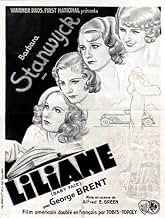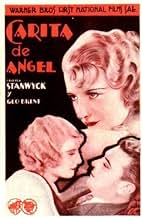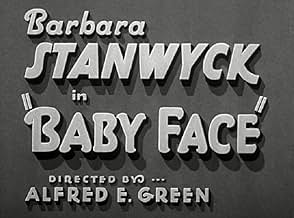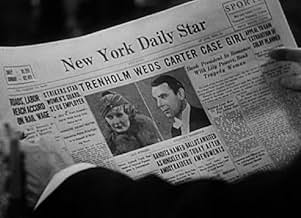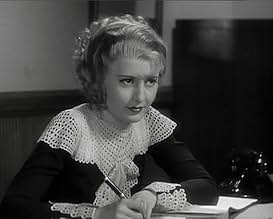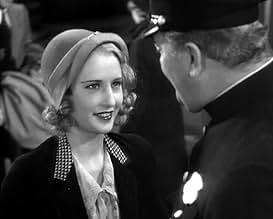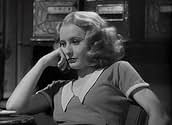एक युवती, जो अपने पूरे जीवन में यौन शोषण का शिकार रही है, पांसा पलटते हुए बड़े शहर के बैंक में असहाय पुरुषों के साथ उल्लासपूर्वक यौन संबंध स्थापित कर उनका शोषण करने का निर्णय लेती है.एक युवती, जो अपने पूरे जीवन में यौन शोषण का शिकार रही है, पांसा पलटते हुए बड़े शहर के बैंक में असहाय पुरुषों के साथ उल्लासपूर्वक यौन संबंध स्थापित कर उनका शोषण करने का निर्णय लेती है.एक युवती, जो अपने पूरे जीवन में यौन शोषण का शिकार रही है, पांसा पलटते हुए बड़े शहर के बैंक में असहाय पुरुषों के साथ उल्लासपूर्वक यौन संबंध स्थापित कर उनका शोषण करने का निर्णय लेती है.
- पुरस्कार
- कुल 1 जीत
- Brody
- (as Douglas Dumbrille)
- Job Seeker
- (बिना क्रेडिट के)
- Paris Bank Clerk
- (बिना क्रेडिट के)
- Hodges
- (बिना क्रेडिट के)
- Speakeasy Waiter
- (बिना क्रेडिट के)
- Speakeasy Customer
- (बिना क्रेडिट के)
- Paris Bank Agent
- (बिना क्रेडिट के)
- Lutza
- (बिना क्रेडिट के)
कहानी
क्या आपको पता है
- ट्रिवियाIn 2004, when Michael Mashon, a curator of the motion picture division at the Library of Congress, received a request for a print of this film, he discovered two negatives of the film: the original camera negative and a "duplicate negative" that was longer. The duplicate negative was the pre-release (uncensored) version of the film that was submitted to the New York State censorship board in 1933 for approval. The uncensored version received its public premiere at the London Film Festival in November 2004, more than 70 years after it was made. The existence of these negatives allows pristine quality prints to be made as compared to other surviving films of that era.
- गूफ़When Lily reads from Nietzsche's book, Thoughts Out Of Season, the page that's highlighted repeats the same paragraph above, and again below, the highlighted lines.
- भाव
Nick Powers: You little tramp, you!
Lily Powers: Yeah, I'm a tramp, and who's to blame? My Father. A swell start you gave me. Ever since I was fourteen, what's it been? Nothing but men! Dirty rotten men! And you're lower than any of them. I'll hate you as long as I live!
- इसके अलावा अन्य वर्जनThe original release had to be cut by four minutes to pass inspection by the New York Board of Censors. The cuts were mostly very minor, but the most notable were the scene where Lily admits that she began working as a prostitute when she was fourteen and the scene in the boxcar with the yardman, the closeup of the hand turning out the light. These scenes were cut before the film's release in 1933 and were not seen publicly until 2004.
- कनेक्शनFeatured in The Love Goddesses (1965)
- साउंडट्रैकBaby Face
(1926) (uncredited)
Music by Harry Akst
Played during the opening credits
Played as background music often
Reprised on a phonograph record
Barbara Stanwyck is indeed amazing in the role of Lily Powers (notice the moniker), a part that called for just the right amount of sexuality coated with power, cunning, and revenge, yet tinged with virginal pretense when called for, a very difficult portrayal to make convincing. Barbara Stanwyck conveys the necessary nuances to show that though she sleeps her way to the top (literally), she still has good in her heart--note the way she treats those few who have been kind to her such as Chico (the marvelous actress Theresa Harris) and the old philosopher. And though she exploits her sexuality to make mush of men who are rich and powerful, those same men are attempting to exploit her for their carnal desires with no intention of permanent ties until they fall in love with her.
Lily Powers fails to understand, at first, that emotions are difficult to ride, that it's easy to lose control. One possible result is death. Hitching a wagon to a star of course materialism can take one to a destination where nothing else exists but the ephemeral, and it's a cold lonely location.
A word should be said about the philosophy of Friedrich Nietzsche whose will to power is stressed in "Baby Face" by the elderly philosopher who befriends Lilly when she is still turning tricks for her old man. "Baby Face" was released the same year Adolf Hitler came to power in Germany. Though it's highly unlikely that the semi-literate Hitler understood much about Nietzsche, he considered himself a Nietzschean to the nth degree and touted it along side his other rantings. "Baby Face" serves as an indictment of the popular interpretation of Nietzsche's will to power concept, especially in the final scenes.
Although "You've got the cutest little baby face." is apropos as a theme for "Baby Face," an even more telling and applicable melody is W. C. Handy's "St. Louis Blues" played throughout the film, especially at times when the camera has to drift away from what would otherwise be sexually explicit scenes. "St. Louis Blues" is also used wisely toward the end as Lily begins to see beyond materialism to eternal values. Chico is singing a raw, salacious version of "St. Louis Blues" when Lily, now disagreeing with the lyrics, orders her to stop.
The restored version of "Baby Face" makes the film more modern in its approach and attitude toward sex as power than many a new Hollywood release. By all means watch this gem from the distant past and enjoy.
टॉप पसंद
- How long is Baby Face?Alexa द्वारा संचालित
विवरण
- रिलीज़ की तारीख़
- कंट्री ऑफ़ ओरिजिन
- भाषाएं
- इस रूप में भी जाना जाता है
- 娃娃臉
- फ़िल्माने की जगहें
- उत्पादन कंपनी
- IMDbPro पर और कंपनी क्रेडिट देखें
बॉक्स ऑफ़िस
- बजट
- $1,87,000(अनुमानित)
- चलने की अवधि1 घंटा 11 मिनट
- रंग
- ध्वनि मिश्रण
- पक्ष अनुपात
- 1.37 : 1
इस पेज में योगदान दें



